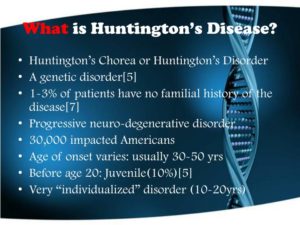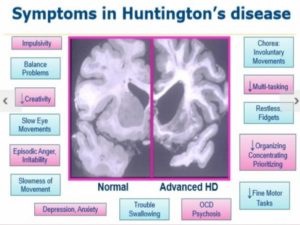Causes:
Huntington’s disease is caused by an inherited defect in a single gene. Huntington’s disease is an autosomal dominant disorder, which means that a person needs only one copy of the defective gene to develop the disorder.
With the exception of genes on the sex chromosomes, a person inherits two copies of every gene — one copy from each parent. A parent with a defective gene could pass along the defective copy of the gene or the healthy copy. Each child in the family, therefore, has a 50 percent chance of inheriting the gene that causes the genetic disorder.
Complications:
After the start of Huntington’s disease, a person’s functional abilities gradually worsen over time. The rate of disease progression and duration varies. The time from disease emergence to death is often about 10 to 30 years. Juvenile Huntington’s disease usually results in death within 10 years after symptoms develop.
The clinical depression associated with Huntington’s disease may increase the risk of suicide. Some research suggests that the greater risk of suicide occurs before a diagnosis is made and in the middle stages of the disease when a person has begun to lose independence.
Eventually, a person with Huntington’s disease requires help with all activities of daily living and care. Late in the disease, he or she will likely be confined to a bed and unable to speak. However, he or she is generally able to understand language and has an awareness of family and friends.
Common causes of death include:
- Pneumonia or other infections
- Injuries related to falls
- Complications related to the inability to swallow
Prevention:
People with a known family history of Huntington’s disease are understandably concerned about whether they may pass the Huntington gene on to their children. These people may consider genetic testing and family planning options.
If an at-risk parent is considering genetic testing, it can be helpful to meet with a genetic counselor. A genetic counselor will discuss the potential risks of a positive test result, which would indicate the parent will develop the disease. Also, couples will need to make additional choices about whether to have children or to consider alternatives, such as prenatal testing for the gene or in vitro fertilization with donor sperm or eggs.
Another option for couples is in vitro fertilization and preimplantation genetic diagnosis. In this process, eggs are removed from the ovaries and fertilized with the father’s sperm in a laboratory. The embryos are tested for presence of the Huntington gene, and only those testing negative for the Huntington gene are implanted in the mother’s uterus.


